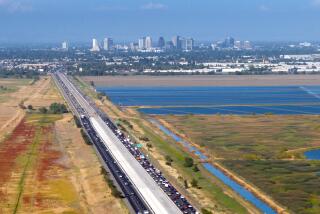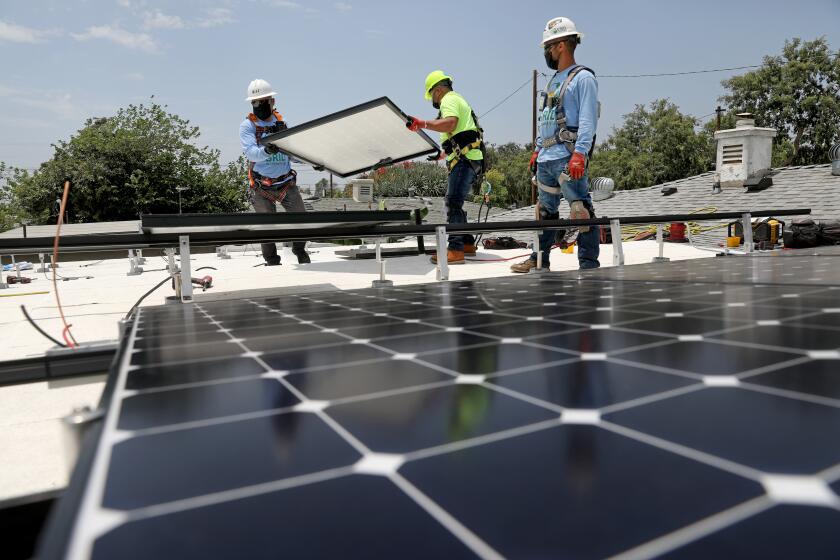Editorial: Widening freeways is so 20th century — the 710 Freeway deserves better
- Share via
The 710 Freeway is a congested, diesel-polluted mess of a road. Built in the 1950s and 1960s, it was never intended to accommodate the endless swarm of vehicles, and particularly trucks, using the freeway today.
Seven days a week, big rigs rumble up and down the 710, hauling containers from the nation’s largest seaport complex in San Pedro and Long Beach to the sprawling rail yards in Commerce and Vernon east of downtown. The route can become so busy that trucks stretch bumper to bumper for miles in the right lanes, boxing passenger cars in and causing them to miss their exits. That’s one reason the accident rate on the 710 is higher than on other freeways.
Simply widening the 710 Freeway is a missed opportunity and a waste of taxpayer money.
The route carries so many diesel trucks, nearby communities have dubbed the corridor a “diesel death zone” from the concentration of toxic diesel soot and emissions.
The Metropolitan Transportation Authority is now looking to update the 710. But despite decades of studies of forward-looking ways to improve congestion and air quality — for example, separating trucks from cars or requiring low-emission trucks — Metro is looking at a solution straight out of the 1950s: Widening the freeway. The Metro staff has recommended a $6-billion project that would add one lane in each direction from Ocean Avenue in Long Beach to the 60 Freeway in East Los Angeles, while also upgrading some interchanges. Metro’s board of directors will vote on it this week.
The engineers working on the project say widening the freeway is the most affordable option, which is important given the lack of funding so far. Metro has $1 billion now and doesn’t know where the rest will come from. By contrast, another option that the staff didn’t support — building a four-lane route for low- or no-emission trucks above the existing 710 Freeway — would cost at least $10 billion.
Still, even the cheaper project would be one of the most expensive freeway widening efforts in county history. And for what? It’s unlikely that adding two new lanes will make a lasting impact on congestion because of the phenomenon of “induced demand.” Widening a freeway to ease traffic actually induces more people to drive, which results in similar or worse congestion than before the project. A wider 710 could end up being the same clogged, dirty, dangerous corridor it is today.
Simply widening the freeway is a missed opportunity and a waste of taxpayer money. If Metro and the California Department of Transportation want to spend $6 billion on an anachronistic freeway widening, they ought to use the project as a catalyst for cleaning up the freight industry and advancing the plans for a zero-emission port complex.
Why not think big and ambitious about how transportation infrastructure can change the marketplace? The agencies could designate the new road space as truck lanes accessible only to zero-emission trucks. Or they could make them express lanes for big rigs with the toll based on truck emissions. The cleaner the engine, the lower the toll. That could encourage trucking companies to speed up their transition to clean vehicles.
So far, Metro is proposing to address diesel pollution by pledging to find $100 million in grants to help subsidize the purchase of clean trucks to drive on the wider 710 Freeway. Supervisor Janice Hahn recommended boosting that to $200 million. But there’s no guarantee the money will come through.
State and local officials have rightfully recognized that while goods movement is a vital part of the regional economy, it’s also incredibly dirty. The ports of Los Angeles and Long Beach are the largest source of air pollution in the region, with trucks and ships spewing smog-forming pollutants and cancer-causing diesel particles. The port complex is also a major emitter of greenhouse gas emissions.
The state has adopted a Sustainable Freight Action Plan to develop more efficient ways of moving cargo and to transition the diesel-dominated industry to zero-emissions equipment. Los Angeles Mayor Eric Garcetti and Long Beach Mayor Robert Garcia set a goal for their ports to go zero emissions by 2035.
So if the region is going to fix the 710 Freeway, any solution has to guarantee significant cuts to diesel and greenhouse gas emissions and move the region toward a more sustainable cargo-moving industry. The current proposal to widen the freeway doesn’t do that. Metro’s board of directors shouldn’t settle for it.
Follow the Opinion section on Twitter @latimesopinion and Facebook
More to Read
A cure for the common opinion
Get thought-provoking perspectives with our weekly newsletter.
You may occasionally receive promotional content from the Los Angeles Times.









